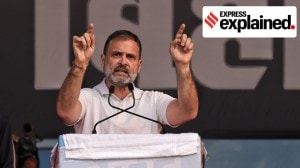- India
- International
India may now be on the road from proprietary to pinstripe capitalism
Demonetisation, along with GST, will bring about a fundamental reordering of business enterprise in India.
 The romanticisation of ordinary folk plying their trade was a fundamental aspect of the understanding of early capitalism.
The romanticisation of ordinary folk plying their trade was a fundamental aspect of the understanding of early capitalism.
Capitalism’s social and political legitimacy derives from the industrious small businessman and the innovative garage entrepreneur. The key protagonists in Adam Smith’s The Wealth of Nations were not the directors of South Sea Company or Bank of Scotland, but the butcher, brewer, baker, flour miller, candle-maker and pin factory owner. Margaret Thatcher prided herself on being the daughter of a greengrocer, just as Narendra Modi’s humble chaiwala origins featured prominently in his breathless 2014 election campaign.
This romanticisation of ordinary folk plying their trade couldn’t have found better expression than in the populist American politician William Jennings Bryan’s famous ‘Cross of Gold’ speech of July 1896: “The merchant at the crossroads store is as much a businessman as the merchant of New York. The farmer who goes forth in the morning and toils all day, begins in the spring and toils all summer, and by the application of brain and muscle to the natural resources of this country creates wealth, is as much a businessman as the man who goes upon the Board of Trade and bets upon the price of grain.”
Watch What Else is Making News
It is these small private businesses — comprising the bulk of India’s 58.47 million establishments employing 127.71 million workers, as per the Sixth Economic Census in 2013-14 — that are today facing the heat of the Modi government’s November 8 decision to ‘demonetise’ all Rs 500 and Rs 1,000 denomination notes. Together with the 138.35 million farms (2010-11 Agriculture Census), they make up India’s ‘informal’ enterprise economy that largely deals in cash — whether for sale and transport of produce, purchase of inputs or payment of wages. With over 86% of the total value of currency in circulation getting withdrawn, a whole segment of the economy engaging roughly four-fifths of the country’s labour force is suddenly without the vital lubricant to grease the wheels of its engine.
The contraction in economic activity we are witnessing post-demonetisation is a story mostly of informal enterprises that find themselves unable to sell, buy or hire labour, with cash disappearing from the system overnight. True, the ‘formal’ sector has also been affected, not the least because while its dealings with carrying and forwarding agents or super stockists may be via cheques/bank transfers, downstream transactions are still significantly in cash. To the extent last-leg sales have taken a hit, the informal economy’s troubles would obviously percolate upwards through destocking across the distribution channels.
But the difference lies in the levels of resilience. The big organised sector players are in a much better position to weather the current storm. Even if their sales fall — in an economy whose two growth engines (private investment and exports) were barely running, the third one (government spending) cannot be revved up due to fiscal constraints, and the shine’s now gone off the fourth lone bright spark (private consumption) — they aren’t going to shut shop. The ones to perish will be the small fish in the informal sector, which accounts for an estimated 40% of India’s GDP and much of whose operations are cash-based and non-tax paying.

We don’t know how many of the small businesses would adapt to the new situation by installing point-of-sale terminals — there are just 1.5 million of them right now — or opting for mobile wallets and other digital payment platforms. But one thing is clear: the advantage that informal enterprises hitherto enjoyed by not paying or avoiding taxes — which doing business in cash allowed — will no longer be there. Demonetisation has created an environment where cash transactions will probably cease to hold sway, even after the present liquidity crunch in the economy ends. That, along with implementation of a nationwide goods and services tax (GST) regime, may herald the transition to a less-cash economy, in which most transactions would get captured and leave a paper trail for the revenue authorities to crack down on any evasion.
What this could also do — something that the equity research firm Ambit Capital has suggested in a recent report — is throw a host of micro, small and medium-sized enterprises out of business, as they find it unviable to operate by paying full taxes. That, in turn, might provide opportunities for the bigger organised firms to occupy the space and market share ceded by the informal sector.
In fact, a plausible reason for the Sensex and Nifty falling hardly 5% since November 8 — not really much, given the body blow that demonetisation has delivered to private consumption — may well have to do with the prospect of listed formal sector companies gaining in the long run. As the informal sector’s size shrinks to, say, 20% of the Indian economy — Ambit Capital expects that by 2018-19 — the likes of VRL Logistics and Gati Ltd (transport), Century Plyboards and Greenply Industries (plywood), Havells and Crompton Greaves (consumer electricals), Bata and Liberty Shoes (footwear), and Big Bazaar and Bigbasket.com (grocery retail) could benefit from increased market shares in their respective industries. We have seen such ‘formalisation’ taking place in the odd sector such as gold retailing, where the traditional family jeweller has, over the course of the last two decades, steadily given way to the Tanishqs, Gitanjalis, Joyalukkas, Kalyans and Tribhovandas Bhimji Zaveris. That is likely to now become a generalised trend.
If this, indeed, were to happen, it amounts to no less than a fundamental reordering of Indian capitalism. The significant thing here is that the marginalisation of the proprietor-businessman and resultant takeover by the corporate-capitalist wouldn’t be the outcome of the vicissitudes of the normal business cycle, leading to mass firm closures. Instead, it will be brought about by shock therapy, ironically administered by a government whose main ruling party has counted the ‘bhagidari’ sector to constitute its most reliable vote base. The fight against foreign direct investment in multi-brand retail was, after all, premised on millions of small proprietary/partnership businesses being swamped by a Walmart or Tesco — a fear that Modi’s party adroitly exploited.
But politics apart, the replacement of informal proprietary capitalism by formal pinstripe capitalism has social implications as well. It could take some time for the suit-boot wala, as opposed to the neighbourhood bania, to become the acceptable face of Indian business.
EXPRESS OPINION
Apr 25: Latest News
- 01
- 02
- 03
- 04
- 05









































